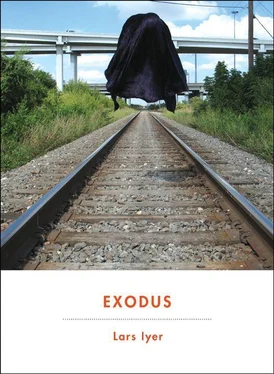‘Does Sal tear at your roots?’, W. asks. ‘Is Sal going to have to get a restraining order against you?’ What did she say when I told her of Rosenzweig’s love for his best friend’s wife? — ‘Don’t get any ideas, fat boy!’
Then there was the romance between Kierkegaard and Regine, W. says. Kierkegaard knew almost as soon as he proposed to her, that he had made a mistake. But she’d said ‘yes’, and what was he to do now?
Kierkegaard wrote thirty-one letters in which he tried to make Regine realise how unsuited he was for marriage. ‘ You must understand I am subject to a higher calling …’; ‘ A man must be allowed to rise to his true vocation … ’ Kierkegaard sent her a book called Old Memories , and told her that she was already a thing of his past. And then he sent her his engagement ring, accompanied by a letter of farewell.
Regine ‘ fought like a lioness ’, Kierkegaard wrote. And then, one terrible night, she confronted him and tore to pieces a little note he had written to her, which she carried in her bosom. — ‘ So you have played a terrible game with me ’. And then, ‘ Now I can bear it no longer; kiss me one last time and then have your freedom ’.
Kierkegaard was given his freedom, W. says, but freedom for what? To remember his love, and to revel in remembering. To intertwine his beloved with his published writings as in ‘a secret arabesque ’ …
Ah, it’s typical gentile self-indulgence, W. says. Kierkegaard thought he was sacrificing his engagement in the name of a higher cause, W. says. He didn’t realise that Regine was the higher cause! Kierkegaard thought the religious was higher than the ethical, W. says. He didn’t realise that the basis of the ethical lies in the religious! Or is it the other way round?
Sal is his higher cause, W. says. She’s our higher cause! Ah, what was he, before Sal? W. says. He listened only to Mahler and Gary Glitter, he remembers that. He wore white jeans and espadrilles and ’80s owl glasses. And if W. was a scholar back then, he was a scholar without heart , a scholar who didn’t understand the meaning of scholarship, a scholar who understood nothing of what scholarship honours . He was a scholar without a higher cause …
St. Hilda’s College. We sit under the tree, a few of us, smoking. Žižek passes by. — ‘So this is where they exile the smokers!’ he cries.
Where’s Žižek off to? we wonder. He must have better things to do than hang around Oxford, we agree. He’s probably going to see his wife, who’s an Argentinean model, or something. A model-psychoanalyst. No, they got divorced, someone says.
We remember the photograph of Žižek and his model wife, taken the day they got married. It was circulated on the ’net. He looked hungover, regretful, vaguely surly. We felt he was one of us. How else would we look on our wedding day?
W. won’t hear a word against Žižek, he says, although he hasn’t read a line of Žižek’s work. Žižek’s what we all should be, W. says. He’s a grafter, just as we should be grafters. He fills bookshelves with his publications, just as we should fill bookshelves with our publications. He’s contracted diabetes from the sheer intensity of his thinking, just as we should contract diabetes from the sheer intensity of our thinking. He’s working his way to exhaustion and early death, just as we should be working our way to exhaustion and early death.
W. knows why academics hate Žižek so much, he says. It’s because Žižek’s got their number. Žižek knows what he would have been had he not been banned from teaching by Yugoslavian academia. He knows he would have been ‘ a poor stupid unknown professor from Ljubljana, probably dabbling in a little bit of this thinker, a little bit of that, a little bit of Marxism and so on ’. A poor stupid unknown professor just like all the other poor stupid unknown professors, just like all of us. A dabbler, writing on this and then that, lecturing on this and then that … oh God! Oh God!
Žižek’s off, possessed by the most urgent of philosophical questions. But where are we going, who sit smoking under the tree? What possesses us, we dabblers, we poor stupid unknown idiots …?
What did Mladen Dolar, Žižek’s old friend and comrade, tell us about intellectual friendship ? W. says. What, of his friendship with Žižek, Zupančič and the others; what, of his old associations with Mocnik and Bozovic when they combined to form the so-called Ljubljana School of Psychoanalysis ?
That they began with friendship, and were sustained through friendship! W. says. That they never departed from friendship in the face of Yugoslavian academia and the Yugoslavian state department. What chance did they have to get jobs, as they fell foul of the university authorities and the state authorities, and were unemployed for many years? What chance, as they aroused their managers’ suspicion because of their interest in French thought, in psychoanalytic thought, and brought the luminaries of the French Lacanian School to Ljubljana?
They formed the Journal for the Society of Theoretical Psychoanalysis to publish one another, to support one another in thought, said Dolar. And in the end, what was the Society of Theoretical Psychoanalysis ? Nothing! said Dolar. There was nothing going on at the centre, just him, Žižek and Zupančič drinking in a bar. It was the same with Žižek’s series Wo es War , for Verso. There was no editorial board sitting in judgement, no solemn academic gatekeepers. It was a vehicle for Žižek to publish his Slovenian friends abroad!
Ah, how much we have to learn from the Ljubljana School of Psychoanalysis ! How much, from Wo es War ! Do we need to form a journal? we wonder. Do we need to form a society? No: first of all, we need friends! , W. says. We need to be friends, don’t I understand? And we need to have ideas!
Mladen Dolar was the real thing, we agree. The real Central European intellectual. — ‘How do you think you looked when you sat beside him at that conference?’, W. says. ‘How do you think you came across, chairing his presentation?’
I was having a bad morning, I told W. later. But that didn’t excuse it, W. says. A bad morning! — ‘That question you asked …’ He knew I was in trouble when Dolar finished reading, and the audience, taking in the many and rich ideas he had developed with exemplary grace and exemplary clarity, kept quiet. W. knew I was for it when it fell to me, Dolar’s chair, to ask a question.
I could barely speak! W. says. I babbled incoherently. I raved. — ‘Everyone was hoping you’d stop’. But I didn’t stop, did I? I carried on and on and on. Marx, this; Feuerbach, that. Some blousy-shirted idiot carrying on, W. says, and next to a real Central European intellectual …
Ah, how many times have I covered myself in shame, and by extension, covered him, W., in shame? How many times have I covered us both in shame? He’d been too stunned to explain me to Dolar, as he should have done, W. says. He — who should have known it would be necessary — simply wasn’t ready to provide the usual excuses.
We’re not going back into the conference, we decide. Žižek’s gone, and why shouldn’t we go? He’ll follow me, W. says. I have a great instinct for escape, like a confined ape waiting for his keeper’s inattention. At a moment’s notice, I’ll vault the walls …
W.’s ready to vault after me, he says. He’s had enough! Isn’t that why he keeps me with him: to be alongside another who has had enough ?
Читать дальше












